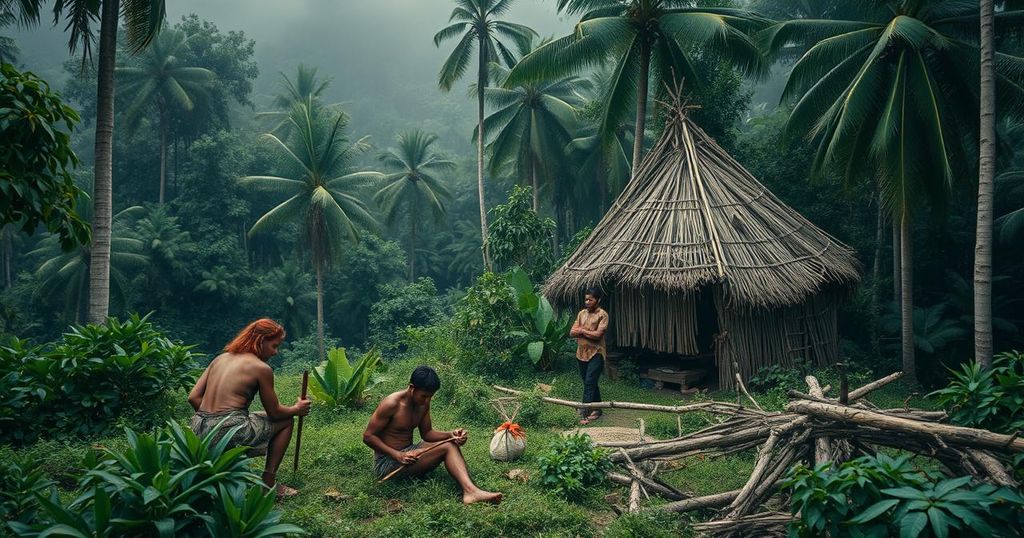The Vulnerable Reality of Uncontacted Tribes: Insights from Recent Contact in Brazil

A recent peaceful contact by an isolated tribe in Brazil uncovers the complexities surrounding uncontacted groups, revealing that fear, past exploitation, and traumatic experiences shape their interactions with outsiders. Ongoing threats from illegal activities compound the risks faced by these tribes, underscoring the dire need for protective measures and transparent policies to safeguard their existence.
A recent emergence of an isolated tribe in Brazil’s Acre state has prompted investigations into the realities faced by uncontacted peoples. Amid fears of violence and exploitation from outsiders, the tribe’s interaction with local villagers reveals the tragic consequences of their previous experiences with outsiders. Driven by survival instincts rather than a curiosity about the outside world, the tribe approached the village under the duress of violent encounters that have led to the massacre of their relatives and threats to their territory. Many of these isolated tribes, often deemed uncontacted, actually possess knowledge about the broader societal landscape they inhabit, having experienced various forms of contact throughout history. Isolated tribes across the globe, particularly in Brazil, Peru, and Papua New Guinea, carry with them historical trauma from past encounters with outsiders. Anthropologists assert that these tribes, while labeled uncontacted, have often been subjected to violence, disease, and exploitation. For instance, a prominent case highlights an individual from a tribe that was nearly wiped out due to ranchers’ aggression. Efforts to establish contact in previous decades often led to further violence or catastrophic disease outbreaks, as indigenous peoples lacked immunity to common illnesses brought by outsiders. Sydney Possuelo, the former head of Brazil’s Funai, strongly advocated for a non-intrusive approach, emphasizing that isolated populations should remain protected in natural reserves. His philosophy reflects a growing concern that unwarranted contact frequently results in detrimental outcomes for indigenous communities. Sadly, the current landscape shows that dangers persist as the recent contact incident has already led to health concerns within the tribe due to exposure to foreign viruses, raising fears of further disease spread among their population. Despite these concerns, no international guidelines exist to adequately address the complexities surrounding contact with isolated tribes. Brazil’s governmental agency Funai holds a critical but opaque role in managing these interactions, often lacking historical insight and effective communication strategies. As illegal activities such as logging and drug trafficking encroach upon tribal lands, there is an urgent need for proactive protective measures to safeguard these vulnerable communities from extinction through increased transparency and respect for their autonomy.
The plight of uncontacted tribes presents an alarming intersection of cultural preservation and the repercussions of human encroachment. This particular article reflects on the recent establishment of contact with an isolated tribe in Brazil’s Amazon region and the subsequent discussions surrounding the complex relations between these tribes and the outside world. Various studies indicate that rather than living in complete isolation, many of these tribes have had previous contacts, which often ended in violent encounters and exploitation, leading to their fear of outsiders. This narrative is reinforced by anthropological research that illustrates how historical trauma and cultural narratives of violence shape the behaviors of these uncontacted peoples. Moreover, the lack of international frameworks for handling contacts with such tribes exacerbates inherent risks, especially concerning health crises arising from exposure to newly introduced pathogens.
In conclusion, the contact with uncontacted tribes reveals a complex narrative characterized by historical trauma, fear of violence, and potential health risks. While the notion of uncontacted tribes may evoke romanticized imagery of isolation, the reality paints a tragic picture of ongoing threat and misunderstanding. Current policies must evolve to ensure the protection of these vulnerable populations from both external exploitation and the devastating consequences of unforeseen diseases. Advocating for transparency and respect for the autonomy of isolated tribes will be vital in preventing further loss and ensuring their survival in a rapidly encroaching world.
Original Source: www.bbc.com







